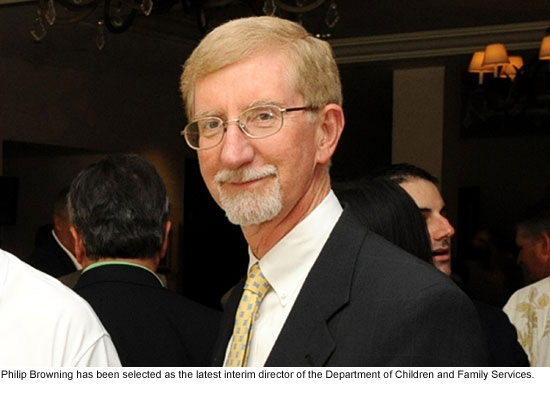The Browning of DCFS
August 10, 2011
 Philip Browning’s wife was, to put it kindly, skeptical when her husband told her that he’d been tapped to temporarily take control of Los Angeles County’s deeply troubled Department of Children and Family Services. “Why,” she asked, “would you want to take on a situation like that?”
Philip Browning’s wife was, to put it kindly, skeptical when her husband told her that he’d been tapped to temporarily take control of Los Angeles County’s deeply troubled Department of Children and Family Services. “Why,” she asked, “would you want to take on a situation like that?”
After all, Browning had emerged as one of the county’s most innovative and effective executives while running the huge Department of Public Social Services, which provides safety-net services for more than 2.6 million people on the economic margins of society.
Browning’s answer to his wife, who used to be a child protective services worker, was simple and direct: he was jumping into the DCFS pressure cooker because the Board of Supervisors asked him to do so.
“I was in the military for a long time and was accustomed to being asked to do things not entirely of my own choosing,” says Browning with a hint of his Southern gentility. “I think I have a sense of obligation.”
With the board’s official and unanimous vote for Browning this week, he becomes DCFS’ third interim director in the past nine months, following the dismissal of permanent chief Trish Ploehn amid an uproar over a number of high-profile child deaths and questions about the department’s forthrightness.
Browning was selected by board members who’d grown so dissatisfied that they retook control of the department’s management several months ago from the chief executive office, which had been given that responsibility as part of a sweeping remake of county government in 2007.
Although Browning is an interim director, the board has made it clear that they do not want just a seat-warmer while a search is underway for a permanent boss. He is empowered to take the actions necessary to improve the agency’s performance, as he has done at DPSS, making it among the nation’s leaders in serving its clients.
Whether at DPSS or DCFS, Browning says he offers a consistent approach. “The goal is to hire qualified people, get them trained and hold them accountable.” He says he knows that, for some managers, that final piece—accountability—can be uncomfortable.
“It’s tough to take the difficult disciplinary actions. We let people stay in positions where we know they should be moved,” says Browning, recalling times that he’s recommended the dismissals of longtime DPSS employees for violating client confidentiality or committing other serious transgressions.
That said, Browning is known as a team builder—more inclined to motivate than criticize. He also is legendary for his reliance on statistics to gauge an operation’s effectiveness. “Without good data,” he says, “you can’t change a program.”
At DPSS, he says, “we measure everything that is possible to be measured.” Those numbers are then analyzed monthly in a formal setting by managers.
“When I first came to DPSS, it was a very scary process,” Browning says of those sessions. “People would throw up before the meeting. The prior administration was more into criticism. It put too much stress on our employees. I just changed the focus. I told them we are all in this together. Let’s share our secrets of success. Let’s don’t try to be so competitive.”
Late Tuesday, after the board’s vote, Browning sent a memo to DCFS employees. He knows that some of them undoubtedly will be questioning the wisdom of selecting someone not currently immersed in Los Angeles’ child welfare system.
So he wrote of his masters of social work degree and the many years he spent in human services in Alabama and later in Washington, D.C. He recounted his 2001 hiring to turnaround a Los Angeles County District Attorney operation that had been widely criticized for failing to aggressively obtain child support money from so-called deadbeat dads. As the first director of child support services, his office increased collections 36% to $500 million and, he wrote, “moved the agency from a law enforcement system to a human services culture with a priority on customer service.”
Then, after talking about his belief in data, accountability and wellness programs (“I ran my five miles today,” he noted), Browning closed by saying that “the work performed by DCFS is some of the most challenging in America and…will certainly be a challenge to me.”
“I need your help and support.”
Posted 8/10/11












 405 bridge work causes a stink
405 bridge work causes a stink

